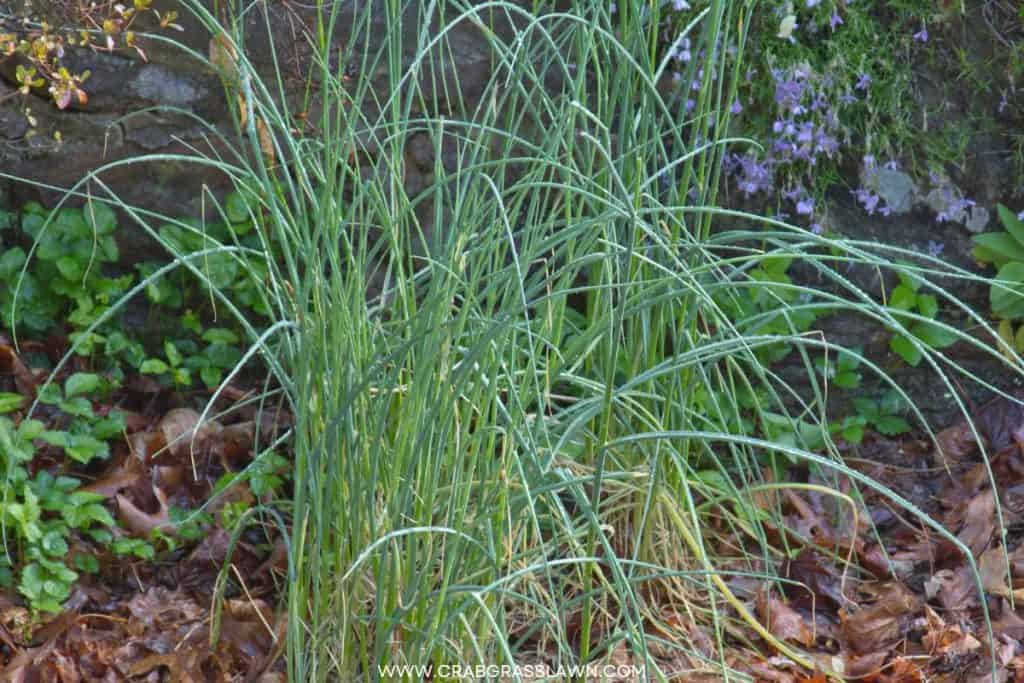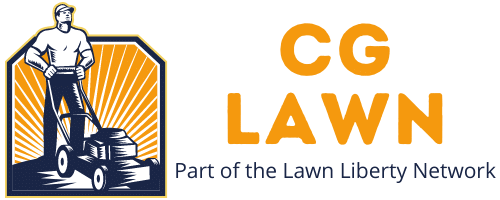Are there pungent onion odors lingering on your lawn? Just like garlic, onions are an allium that contains sulfur compounds with very strong odors. Learn more about alliums.
But if you haven’t planted onions, then the smell is possibly coming from onion grass (wild onions), an incredibly invasive noxious weed that you should try and get rid of ASAP.
What Is Onion Grass?
Just as the name suggests, onion grass looks like grass but is a perennial herb with a distinctive growth behavior.
This cool-season perennial weed is part of the bulbous family but unlike other favorable plants such as garlic, onions, and chives is considered an invasive weed.

What Is the Name for Onion Grass?
Onion grass is also called allium vineale – a perennial, bulb-forming species of wild onion that’s native to Europe, northwestern Africa, and the Middle East.
Allium vineale was introduced in Australia and North America, where it is regarded as a noxious weed. Onion grass is also dubbed as wild garlic, crow garlic, or stag’s garlic.
Identification of Onion Grass
What Does Onion Grass Look Like?
Onion grass looks like grass, more specifically like chives with tubular, tall waxy leaves that emit a garlicky aroma when rubbed.
The leaves of onion grass are shaped like tubes and are thin and long, giving them a grass-like appearance. Onion grass contains bulbs under the surface of the soil, just above the small root system.
The root bulbs of onion grass are a daunting task to control because they spread rapidly and grow from their abundant bulbs each year.
Growing Conditions of Onion Grass
Onion grass grows from a root bulb starting in late fall or early spring. This cool-weather weed thrives in heavy soils and can tolerate cool temperatures and even drought.
Wild onion (onion grass) works in a few ways in your lawn to establish itself. First, the visible onion grass plant produces a flower and drops seeds to establish a thick patch while the underground bulbs will become new plants. The bulbs will go dormant as the weather warms until the temperature lowers.
How Did I Get Onion Grass?
Onion grass is a weed that prefers slightly acidic soils with a pH of 5. If the soil in your lawn is too alkaline or acidic, then onion grass and other weeds can show up in your lawn. Are you aware of the importance of soil testing?
Qualified professionals recommend maintaining a neutral pH of 7, which is great for most turf varieties and garden plants including edible plants.
You can test your soil pH with a DIY soil test kit or by taking a few soil samples and sending them to a lab.
Controlling Wild Onion Grass
Onion grass or wild onion is a tough weed to control and can take a few seasons of care to eradicate. However, here are a few things you can do to accelerate the process.
Can You Get Rid of Onion Grass?
In an attempt to get rid of this common lawn weed, many homeowners pull on the stalks of onion grass, but this is not the right approach to kill onion grass.
When you pull the tall stalks of onion grass, you leave behind the bulb full in-tact in the soil. And since onion grass reproduces from underground bulbs and seeds that are sowed from their blossoms, simply pulling the above-ground stalk will leave you with a bigger mess than you first started.
There are plenty of other strategies you can deploy to get rid of onion grass in your lawn, garden beds, and backyard garden including chemical applications.
Chemical Control Methods for Onion Grass
Onion grass is a perennial weed and as such there are several chemical applications to explore. However, many of these weed killers are non-selective, meaning they will kill onion grass and other favorable plants and favorable plants. Do you know a herbicide is also a pesticide?
Southern Ag Amine 2,4-D weed killer is a highly effective formula to kill onion grass. It can be used to control onion grass and several other broadleaf weeds and woody plants.
- Low, economical use rate of 1 to 4 pints per acre
- Controls many broadleaf weeds & woody plants
- Use in turf, pastures, rangeland, ditch banks, fences…
Affiliate links and images pulled from the Amazon Product Advertising API on: 2024-04-24
You can also apply Ortho WeedClear with your garden hose to kill a wide range of broadleaf weeds. It can be applied in the spring, summer, or fall, and is designed specifically for residential lawns.
- Ortho WeedClear Lawn Weed Killer Concentrate2 kills over 250 listed weeds
- This weed killer controls listed broadleaf weeds like dollarweed, clover, dandelion, chickweed, oxalis, knotweed, henbit, and plantain
- Apply this herbicide in the spring, summer, and fall when weeds are young and actively growing
Affiliate links and images pulled from the Amazon Product Advertising API on: 2024-04-24
How To Get Rid of Onion Grass Naturally?
You can use a shovel or a pitchfork to dig up the complete onion grass plant. But it’s worth mentioning that this is a tiresome task, given that you have to dig roughly 6 inches deep to get to the onion grass bulbs that are buried deeper than your grass.
Leaving behind any parts of the onion grass’s entire plant including its bulbs and waxy leaves and broader leaves is a waste of effort as it will encourage new onion grass growth. Since each lawn is different, it’s best to get individualized advice from a professional lawn care service on how to solve your weed issues.
Comparison of the Effectiveness of Each Method
Applying any chemical treatment to your lawn is risky as it may harm unwanted wild plants and your favorable plants as well.
For example, RoundUp (glysophate) will kill onion grass and all other plants and grass in your lawn, making it a good choice if you’d like to get a fresh start on your lawn.
Pulling onion grass by hand can be a daunting task, but is more effective if done properly, that is remove the grass-like leaves and the bulbs.
How to Prevent Onion Grass From Growing in the First Place
The best way to prevent onion grass allium family and any other weeds from invading your lawn is by properly maintaining your lawn and garden.
Maintenance tips include:
FAQs
Q: What’s the Difference Between Chives and Onion Grass?
A: Onion grass looks a lot like fresh chives but can grow a bit taller than chives. Another difference is in the flavor of chives, where onion grass has a tougher texture when eaten.
Q: Can You Eat Onion Grass?
A: The leaves, flowers, and bulbs of onion grass are edible. The leaves taste like onion and the flowers and bulb are a bit pungent and have a garlic taste.
Q: Should I Pull Onion Grass?
A: You should never pull onion grass because you risk leaving the bulbs behind in the soil, which can give rise to new growth.
Q: How Long Does Onion Grass Last?
A: The bulbs of onion grass have a lifespan of up to 6 years, so controlling onion grass can take many years to be effective.
Q: Is Onion Grass Invasive?
A: Onion grass is a fairly invasive weed in several parts of the world and can easily take over residential lawns.
Final Thoughts
Onion grass won’t cause any problems in your lawn but is an eyesore in a green lush lawn. In addition to that, onion grass has a tougher texture than regular turfgrass, hence may be tough on your lawnmower blades.
The easiest way to get rid of onion grass is with a herbicide but some herbicides are non-selective, meaning they’ll kill onion grass and favorable grass in your lawn.
Hi, Alex Kuritz here. Growing up I remember that my family had one of the best lawns in the neighborhood. Richly green and lush. I did a lot as I grew up in terms of caring and tending for not only my family’s lawn but also my neighbors. I can say I have years of experience, and I am here to share it with you.




